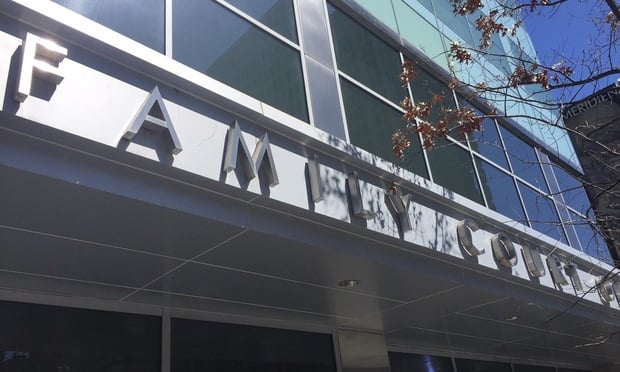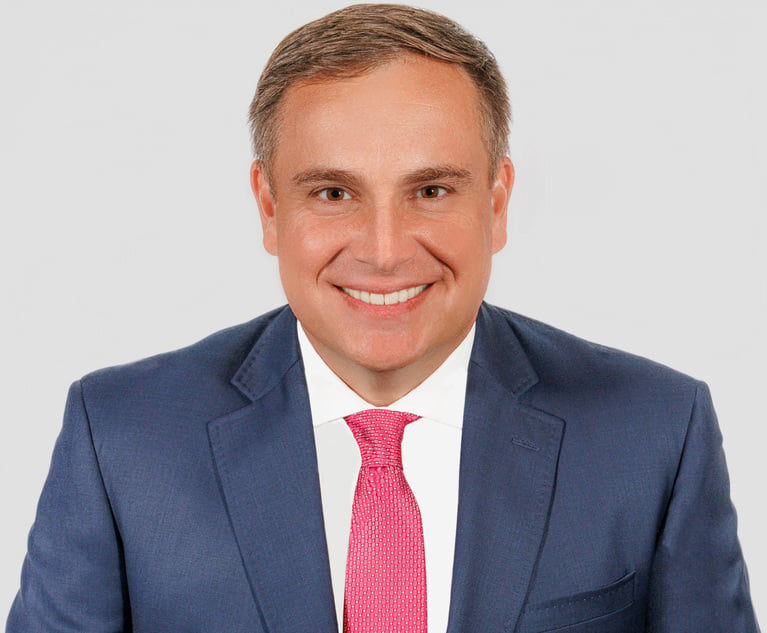2018: When Chaos Came to a Head in Philadelphia Family Court
This year has seen the emergence of several shocking accounts from lawyers and litigants about their experiences in Philadelphia's family court and child welfare system, revealing a troubling trend of institutional secrecy and a lack of oversight.
December 27, 2018 at 04:34 PM
4 minute read
 Philadelphia Family Court building. (Photo: P.J. D'Annunzio)
Philadelphia Family Court building. (Photo: P.J. D'Annunzio)
This year has seen the emergence of several shocking accounts from lawyers and litigants about their experiences in Philadelphia's family court and child welfare system, revealing a troubling trend of institutional secrecy and a lack of oversight.
In April, The Legal reported that sophomore Philadelphia Family Court Judge Lyris F. Younge had an extensive history of violating the due process rights of parents who appeared before her—often in cases where parents were at risk of losing their children.
At the time, it was discovered that Younge was the most appealed and overturned judge in family court. The trend continued throughout the year.
In her first upended decision, Younge was called out by a state Superior Court panel for locking a sick mother out of the courtroom after she had left the dependency hearings to vomit. Younge ruled in favor of the city's Department of Human Services arguments against the mother.
“I'm not allowing her to come back in,” Younge said at the March 16, 2016, hearing just days after joining the bench. “So that testimony is out the window because she walked out without permission of the court. Even if she was sick she should have had the courtesy to let me know that. So her disdain for the court has been so noted.”
That move drew a warning from Superior Court Judge Jacqueline Shogan.
“Although the trial court might well have believed that [the Department of Human Services] presented overwhelming evidence against [the] mother, the trial court violated mother's constitutional guarantee to due process when it precluded her from the opportunity to be heard,” Shogan wrote in an opinion.
As time passed, Younge was admonished for wrongly jailing a grandmother and holding a child in foster care to force a confession of alleged abuse from her parents, and was pulled from a case in which she allegedly held a lawyer in contempt without giving him the opportunity to defend himself.
Her behavior sparked protests, and she was later removed from the Family Court bench and reassigned to conduct civil hearings. She has been the subject of a state Judicial Conduct Board ethics probe since May.
Abuse Claims Emerge From City Foster Care System
Younge also presided over the case of Virginia McKale, who shared the story of her grandson's abuse in foster care.
In McKale's case, her grandchildren were separated after being removed from their mother. Despite McKale's protests that she could house them both in her seven-bedroom home, Younge denied that request because McKale lives across state lines.
McKale alleged that one of her grandsons was later sexually assaulted by another child in a foster home. The Legal reported that McKale's story was one of many accounts of abuse in Philadelphia foster homes and that it was a symptom of a systemic problem that centered on inadequate services provided by Community Umbrella Agencies, or CUAs, which are private entities that DHS contracts with to provide caseworkers in addition to vetting potential foster homes.
CUAs have been sued numerous times over the years for failure to properly vet foster parents who went on to abuse children. Several of those cases have produced multimillion-dollar results.
In November, McKale was silenced by Philadelphia Judge Joseph Fernandes for publicly discussing her grandson's story. The gag order also changed her unsupervised visits with her grandchildren to supervised visits.
In December, Philadelphia City Controller Rebecca Rhynhart confirmed that her office is considering initiating a performance audit of DHS.
Chief among Rhynhart's concerns is how DHS removes children from their parents' homes for poverty-based reasons.
“DHS is a big area of the city's budget and is charged with caring for the children in our city,” Rhynhart said. “The reporting that's been done on the issues about kids who have been taken from their parents unfairly and also some of the abuse children have suffered could be cause for concern and it's something my office is looking into.”
A final decision on whether the Controller's Office will pursue such an audit is to be made in early 2019.
This content has been archived. It is available through our partners, LexisNexis® and Bloomberg Law.
To view this content, please continue to their sites.
Not a Lexis Subscriber?
Subscribe Now
Not a Bloomberg Law Subscriber?
Subscribe Now
NOT FOR REPRINT
© 2025 ALM Global, LLC, All Rights Reserved. Request academic re-use from www.copyright.com. All other uses, submit a request to [email protected]. For more information visit Asset & Logo Licensing.
You Might Like
View All
Pa. Superior Court Rules Pizza Chain Liable for Franchisee Driver's Crash
4 minute read
Pa. Defense Firm Sued by Client Over Ex-Eagles Player's $43.5M Med Mal Win
3 minute read

Trending Stories
- 1Adobe’s Chief Cyber Legal & Privacy Officer Talks Managing Gen AI Risks, Cyber Training
- 2The M&A Partners Who Drove the Most Business as Deal Leads Last Year
- 3Recent Ford Bronco Battery Recall Draws Pa. Class Action
- 4Office of Special Counsel Chief Challenges Firing 'Without Cause'
- 5'Supervisor Is a Bully:' State High Court Weighs Liability for Campaign Against Appellate Staff Attorney
Who Got The Work
J. Brugh Lower of Gibbons has entered an appearance for industrial equipment supplier Devco Corporation in a pending trademark infringement lawsuit. The suit, accusing the defendant of selling knock-off Graco products, was filed Dec. 18 in New Jersey District Court by Rivkin Radler on behalf of Graco Inc. and Graco Minnesota. The case, assigned to U.S. District Judge Zahid N. Quraishi, is 3:24-cv-11294, Graco Inc. et al v. Devco Corporation.
Who Got The Work
Rebecca Maller-Stein and Kent A. Yalowitz of Arnold & Porter Kaye Scholer have entered their appearances for Hanaco Venture Capital and its executives, Lior Prosor and David Frankel, in a pending securities lawsuit. The action, filed on Dec. 24 in New York Southern District Court by Zell, Aron & Co. on behalf of Goldeneye Advisors, accuses the defendants of negligently and fraudulently managing the plaintiff's $1 million investment. The case, assigned to U.S. District Judge Vernon S. Broderick, is 1:24-cv-09918, Goldeneye Advisors, LLC v. Hanaco Venture Capital, Ltd. et al.
Who Got The Work
Attorneys from A&O Shearman has stepped in as defense counsel for Toronto-Dominion Bank and other defendants in a pending securities class action. The suit, filed Dec. 11 in New York Southern District Court by Bleichmar Fonti & Auld, accuses the defendants of concealing the bank's 'pervasive' deficiencies in regards to its compliance with the Bank Secrecy Act and the quality of its anti-money laundering controls. The case, assigned to U.S. District Judge Arun Subramanian, is 1:24-cv-09445, Gonzalez v. The Toronto-Dominion Bank et al.
Who Got The Work
Crown Castle International, a Pennsylvania company providing shared communications infrastructure, has turned to Luke D. Wolf of Gordon Rees Scully Mansukhani to fend off a pending breach-of-contract lawsuit. The court action, filed Nov. 25 in Michigan Eastern District Court by Hooper Hathaway PC on behalf of The Town Residences LLC, accuses Crown Castle of failing to transfer approximately $30,000 in utility payments from T-Mobile in breach of a roof-top lease and assignment agreement. The case, assigned to U.S. District Judge Susan K. Declercq, is 2:24-cv-13131, The Town Residences LLC v. T-Mobile US, Inc. et al.
Who Got The Work
Wilfred P. Coronato and Daniel M. Schwartz of McCarter & English have stepped in as defense counsel to Electrolux Home Products Inc. in a pending product liability lawsuit. The court action, filed Nov. 26 in New York Eastern District Court by Poulos Lopiccolo PC and Nagel Rice LLP on behalf of David Stern, alleges that the defendant's refrigerators’ drawers and shelving repeatedly break and fall apart within months after purchase. The case, assigned to U.S. District Judge Joan M. Azrack, is 2:24-cv-08204, Stern v. Electrolux Home Products, Inc.
Featured Firms
Law Offices of Gary Martin Hays & Associates, P.C.
(470) 294-1674
Law Offices of Mark E. Salomone
(857) 444-6468
Smith & Hassler
(713) 739-1250





